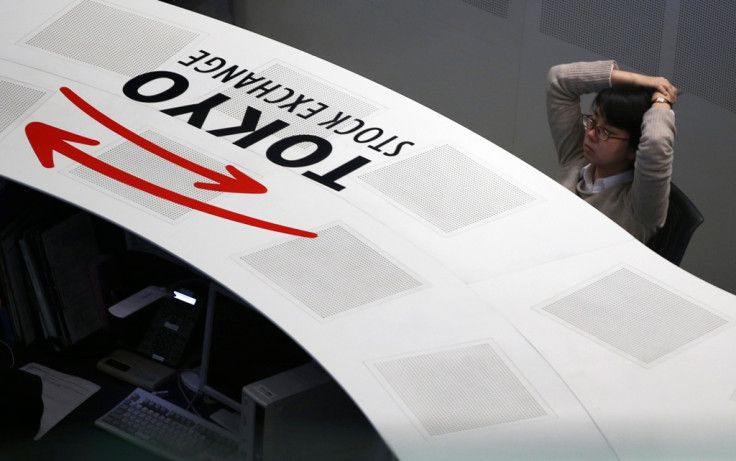Asian Markets Trade Lower after Global Equity Selloff

Asian markets traded lower on 1 August in the wake of a global market selloff the day before, triggered partly by Argentina's default.
However, positive China factory activity data helped calm regional investors.
The Shanghai Composite was trading 0.53%, or 11.57 points, lower to 2,189.99.
Hong Kong's Hang Seng was trading 0.71%, or 175.35 points, lower to 24,581.50
India's S&P BSE Sensex was trading 0.25%, or 65.80 points, lower to 25,829.17.
The Japanese Nikkei finished 0.63%, or 97.66 points, lower at 15,523.11.
Australia's S&P/ASX finished 1.36%, or 76.50 points, lower at 5,556.40.
South Korea's Kospi finished 0.15%, or 3.02 points, lower at 2,073.10.
Data from China showed that the official purchasing managers index (PMI) rose to 51.7 in July, beating expectations. The reading for June stood at 51.
Meanwhile, HSBC's final China PMI reading, for July, stood at 51.7 as well. Manufacturing activity in the world's second-largest economy struck an 18-month high in July, according to HSBC.
Analysts have said that the Argentina default issue will have a "limited" impact on financial markets in emerging economies.
Capital Economics said in a note to clients: "The circumstances surrounding the [Argentina] default are specific to Argentina and thus shouldn't prove to be the trigger for a wider EM sell-off.
"We expect EM currencies and foreign currency bonds to come under further pressure over the coming months, but this is mainly due to the shift towards tighter policy in the US."
Capital Economics said in a separate note: "We do not expect Argentina's default to trigger a prolonged ripple of contagion in the rest of Latin America. There may be some turbulence in the region's financial markets, but we suspect that the actions of the [US Federal Reserve] will continue to have a much larger bearing on risk appetite. Meanwhile, on the economic front, Brazil and Uruguay stand to lose the most from weaker Argentine growth. The aggregate impact will probably be small, although manufacturers may suffer more than most."
Earlier, Capital Economics said: "Confirmation that Argentina has officially fallen into default after failing to agree a deal with holdout creditors is likely to rattle local markets and has the potential to do significant damage to the domestic economy. But we suspect that contagion to other emerging markets is likely to be limited – for financial markets elsewhere in the emerging world, the big issue remains the Fed."
Company Stock Movements
Sony shot up 6% a day after it reported upbeat earnings data. Rival Panasonic added 2% after its April-June operating profit beat forecasts.
Hitachi eased 2.5% despite strong earnings.
In Shanghai, Baoshan Steel shot up some 3%.
In Sydney, Fortescue Metalas dropped some 4%. Endeavor Mining lost 3% while Kingsgate Consolidated shed 2%.
In Seoul, index heavyweight Samsung Electronics lost 2%.
US Markets
Wall Street indices ended in red territory on 31 July on fears about Europe's economy, an Argentine default and after a spike in US labour costs stoked concerns about corporate margins.
The Dow and the S&P 500 logged their first monthly drop since January 2014.
The Dow Jones Industrial Average finished 317.06 points, or 1.9%, lower at 16563.30.
The S&P 500 finished 39.40 points, or 2%, lower at 1,930.67.
The tech-heavy Nasdaq ended 93.13 points, or 2.1%, lower at 4,369.77.
Scott Schuberg, CEO, Rivkin Securities said in a note: "The jury is probably out with respect to what caused last night's sharp sell-off, my best guess is that this is a late response to the previous session's news that the US economy is growing more quickly than expected."
"While seemingly counterintuitive, remember that the market will have to adjust in anticipation of the ultimate reality that US interest rates will rise, and this will cause some bumps along the road. But as I mentioned [on 31 July], those bumps will be cushioned by the overt dialogue that the US Federal Reserve has with the market. If we could get away with a few, few-hundred point drops in the Dow in exchange for the pricing in of a Fed interest rate hiking cycle, I for one would be quite happy..."
© Copyright IBTimes 2025. All rights reserved.


















